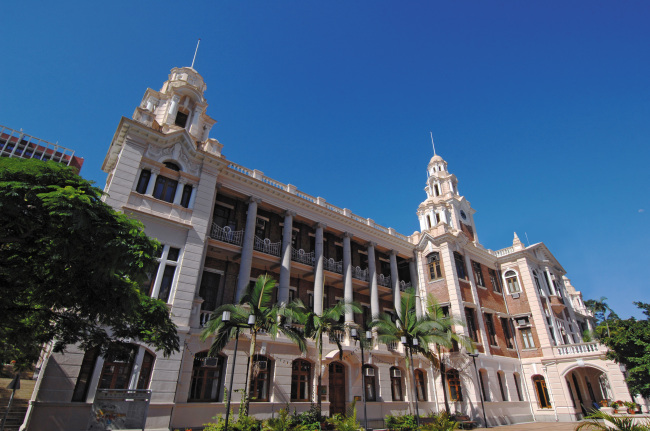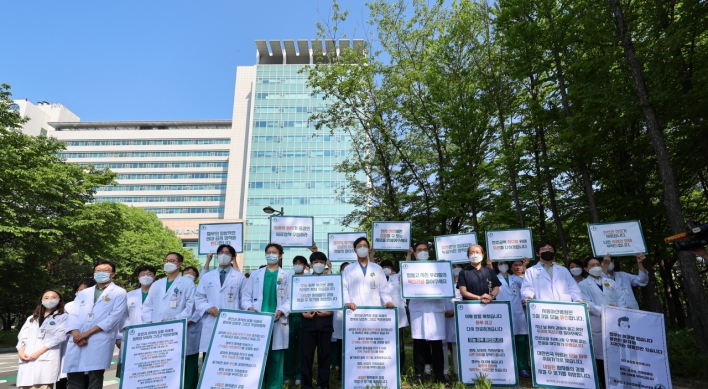University of Hong Kong attracts best students
China’s rise, career prospects power growth of territory’s top school
By Korea HeraldPublished : Nov. 13, 2013 - 19:50
HONG KONG ― About a 10-minute drive up a narrow hill from Lan Kwai Fong, Hong Kong’s buzzing youth hangout and popular tourist attraction, visitors encounter a 100-year-old, Baroque-style building.

The University of Hong Kong was established in 1911 by Britain to compete with the other great powers opening tertiary educational institutions in China.
The territory’s oldest university is today attracting talented students not only from the mainland but from around the world.
International students from more than 80 countries currently account for more than one-third of the entire student population, according to the director of the school’s undergraduate admission.
“Many students from Asian countries are choosing to stay in Asia because there are lots of career development opportunities after graduation,” said John A. Spinks, who is also senior adviser to the vice-chancellor of HKU, in an interview with The Korea Herald.
China is one clear reason behind the growing international student communities on the campus.
As China and other Asian economies continue to boom, in contrast to uncertain economic prospects for the United States and Europe, more Asian students are choosing to study abroad, yet within Asia: It’s the new trend that experts call “glocalization.”
Thanks to its English-speaking environment, HKU has been capitalizing on the exciting time to be at the nexus of China and other parts of the world, Spinks explained.

HKU admitted more than 80 Korean undergraduate students this year alone, and the majority of them graduate from Korea’s most elite high schools such as Daewon Foreign Language High School, Korean Minjok Leadership Academy and Hanyoung Foreign Language High School.
Currently, there are about 300 Korean students including exchange students, the second-largest international group after Chinese foreign students, Spinks said.
He admitted, however, that he was first “puzzled” by the sudden interest from Korean students as there were no more than 10 Korean students before 2009.
“We went to Daewon Foreign Language High School in 2006 and didn’t really get much of a response for a few years, and suddenly a lot of Korean students apply to our school.”
According to him, it was actually Korean media that signaled the sudden influx of Korean students.
“There was some special coverage of how top students from mainland China, who would go to Tsing Hua University or Peking University, apply and even be rejected by HKU,” he said.
“Those particular articles started lots of interest from Korea, and now Korea is one of the largest countries attracting applications,” he said, adding that it proves the global understating of Korean students and their parents.
Sohn In-joo, professor in politics and public administration at HKU, claimed that the more interest people have in China, the more applications the University of Hong Kong receives.
“Korean parents and students now recognize the critical significance of China. But I think because of the language barrier, many Korean students opt for Hong Kong over China,” said the Korean professor, who has been teaching at the school for seven years.
“My parents wanted me to study in Hong Kong as they believed there would be growing opportunities in and around China,” said Park Yea-li, a third-year business administration student.
“All lectures and workshops are in English, which I think will be beneficial for me to work as an accountant in a global company after graduation.”
Career prospects, in fact, are one of the keys to the rapid increase of Korean and other international students, Spinks said.
The school’s figures show that nearly all graduates successfully land jobs after graduation ― in 2012 the graduate employment rate was 99.7 percent, the highest among universities in Hong Kong and perhaps in Asia.
“Safety in Hong Kong is also very good, so parents feel much more assured, and the cost of studying at HKU is comparatively low because fees are subsidized by the Hong Kong government,” Spinks added.
The Hong Kong government’s efforts to exploit the global student market also helped the growth of HKU, which is currently ranked 43rd in the world and third in Asia, according to the most recent worldwide university ranking by Times Higher Education.
The government began new policies in 2007 to provide more scholarships for international students and immigration policies have been liberalized.
Lee Jee-soo, a first-year social sciences student, said she had first considered studying in the U.S., where her friends and tens of thousands of her countrymen have studied.
But she decided to turn to HKU, where she was offered a full scholarship and was able to stay closer to her family in Korea.
“I definitely think there is more support for students here than the U.S,” she added.
HKU has been providing extensive scholarships to attract the most talented students from around the world. For instance it has provided scholarships to support 2,821 students in the 2012/2013 academic year alone.
The university said it continues to expand student exchange programs in recent years to boost diversity. It organized more than 1,500 student exchanges in 2012 alone under the HKU Worldwide Exchange Program, a scheme allowing undergraduates from any major to study abroad at over 200 partner schools.
Spinks said that the school will continue to attract global talent to help maintain and develop Hong Kong as a global city.
“For us, the international students, the capital they bring is not the financial capital; it is intellectual capital. The financial side is not important to us. We’d rather have top students coming into the university than have income coming into the university. That’s our strategy,” he added.
By Oh Kyu-wook, Korea Herald correspondent
(596story@heradcorp.com)
The territory’s oldest university is today attracting talented students not only from the mainland but from around the world.
International students from more than 80 countries currently account for more than one-third of the entire student population, according to the director of the school’s undergraduate admission.
“Many students from Asian countries are choosing to stay in Asia because there are lots of career development opportunities after graduation,” said John A. Spinks, who is also senior adviser to the vice-chancellor of HKU, in an interview with The Korea Herald.
China is one clear reason behind the growing international student communities on the campus.
As China and other Asian economies continue to boom, in contrast to uncertain economic prospects for the United States and Europe, more Asian students are choosing to study abroad, yet within Asia: It’s the new trend that experts call “glocalization.”
Thanks to its English-speaking environment, HKU has been capitalizing on the exciting time to be at the nexus of China and other parts of the world, Spinks explained.

HKU admitted more than 80 Korean undergraduate students this year alone, and the majority of them graduate from Korea’s most elite high schools such as Daewon Foreign Language High School, Korean Minjok Leadership Academy and Hanyoung Foreign Language High School.
Currently, there are about 300 Korean students including exchange students, the second-largest international group after Chinese foreign students, Spinks said.
He admitted, however, that he was first “puzzled” by the sudden interest from Korean students as there were no more than 10 Korean students before 2009.
“We went to Daewon Foreign Language High School in 2006 and didn’t really get much of a response for a few years, and suddenly a lot of Korean students apply to our school.”
According to him, it was actually Korean media that signaled the sudden influx of Korean students.
“There was some special coverage of how top students from mainland China, who would go to Tsing Hua University or Peking University, apply and even be rejected by HKU,” he said.
“Those particular articles started lots of interest from Korea, and now Korea is one of the largest countries attracting applications,” he said, adding that it proves the global understating of Korean students and their parents.
Sohn In-joo, professor in politics and public administration at HKU, claimed that the more interest people have in China, the more applications the University of Hong Kong receives.
“Korean parents and students now recognize the critical significance of China. But I think because of the language barrier, many Korean students opt for Hong Kong over China,” said the Korean professor, who has been teaching at the school for seven years.
“My parents wanted me to study in Hong Kong as they believed there would be growing opportunities in and around China,” said Park Yea-li, a third-year business administration student.
“All lectures and workshops are in English, which I think will be beneficial for me to work as an accountant in a global company after graduation.”
Career prospects, in fact, are one of the keys to the rapid increase of Korean and other international students, Spinks said.
The school’s figures show that nearly all graduates successfully land jobs after graduation ― in 2012 the graduate employment rate was 99.7 percent, the highest among universities in Hong Kong and perhaps in Asia.
“Safety in Hong Kong is also very good, so parents feel much more assured, and the cost of studying at HKU is comparatively low because fees are subsidized by the Hong Kong government,” Spinks added.
The Hong Kong government’s efforts to exploit the global student market also helped the growth of HKU, which is currently ranked 43rd in the world and third in Asia, according to the most recent worldwide university ranking by Times Higher Education.
The government began new policies in 2007 to provide more scholarships for international students and immigration policies have been liberalized.
Lee Jee-soo, a first-year social sciences student, said she had first considered studying in the U.S., where her friends and tens of thousands of her countrymen have studied.
But she decided to turn to HKU, where she was offered a full scholarship and was able to stay closer to her family in Korea.
“I definitely think there is more support for students here than the U.S,” she added.
HKU has been providing extensive scholarships to attract the most talented students from around the world. For instance it has provided scholarships to support 2,821 students in the 2012/2013 academic year alone.
The university said it continues to expand student exchange programs in recent years to boost diversity. It organized more than 1,500 student exchanges in 2012 alone under the HKU Worldwide Exchange Program, a scheme allowing undergraduates from any major to study abroad at over 200 partner schools.
Spinks said that the school will continue to attract global talent to help maintain and develop Hong Kong as a global city.
“For us, the international students, the capital they bring is not the financial capital; it is intellectual capital. The financial side is not important to us. We’d rather have top students coming into the university than have income coming into the university. That’s our strategy,” he added.
By Oh Kyu-wook, Korea Herald correspondent
(596story@heradcorp.com)
-
Articles by Korea Herald










![[K-pop’s dilemma] Time, profit pressures work against originality](http://res.heraldm.com/phpwas/restmb_idxmake.php?idx=644&simg=/content/image/2024/05/08/20240508050705_0.jpg&u=20240508171126)








